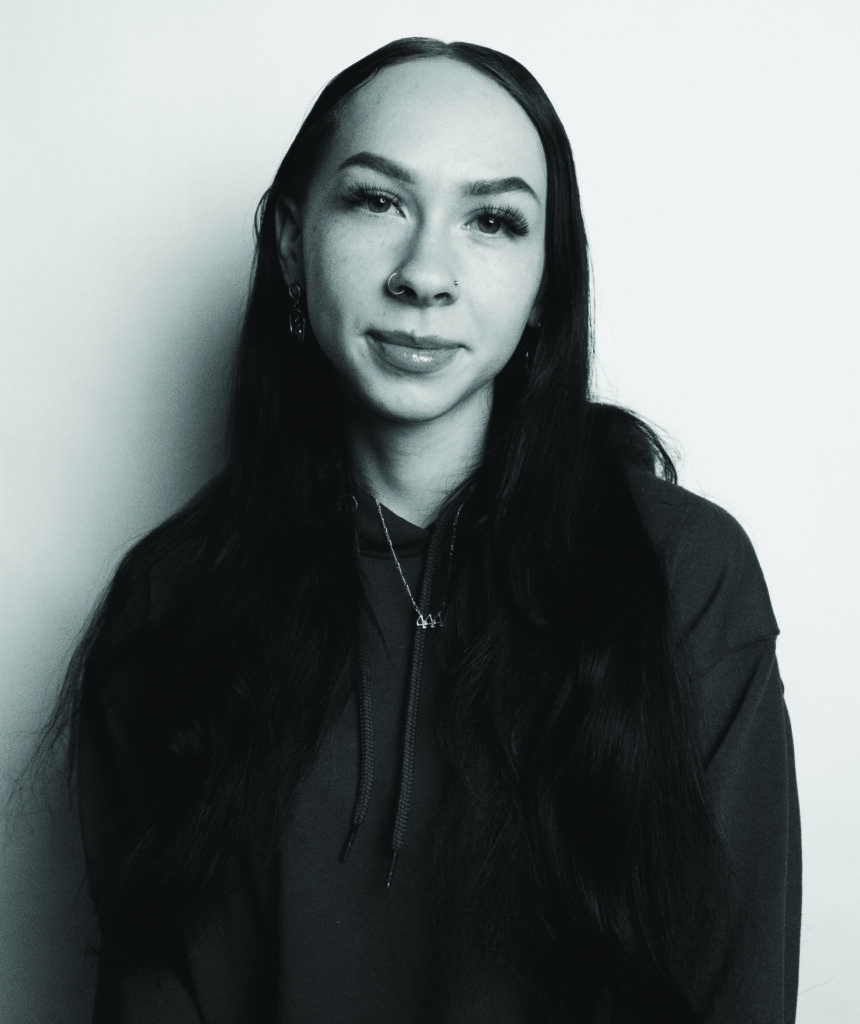By: Ayla Jorgensen

Ava Grace, a student at the University of Minnesota, is a double major in journalism and the Dakota language. Born and raised in Minneapolis, she has always been deeply connected to the city’s vibrant urban Native community.
As a kid, Ava became involved with Dream of Wild Health in South Minneapolis, a program dedicated to restoring health and well-being in Native communities by reviving knowledge of Indigenous foods, medicines and lifestyles. Through this program, she was introduced to traditional practices and learned her first Dakota words and phrases. Her passion for the language grew, and by high school, she was taking college-level Dakota courses, ultimately graduating early to pursue the Dakota language program at the University of Minnesota.
Ava is Lakota, part of the Oceti Sakowin Oyate (Seven Council Fires), a nation made up of distinct but linguistically-related groups. Learning the language and eventually teaching it became a profound source of connection for her to her culture. She wants to pass that on to the next generation. “My ultimate goal is for my kids to be first-language speakers,” she said.
Eventually, she began to write poetry in the language. The odówaƞ iyápi presented here are a result of Ava’s dedication—not just to learning Dakota words, but to internalizing the meaning embedded within the language’s structure. She wrote each poem with the intention that every line supported and enriched the overall meaning, always mindful not to use sacred words or phrases in contexts that did not justify their use.
Mníhaha k’a Owámniomni and Assimilation?
The words Mnihaha (waterfall) and Owamniomni (turbulent water) are the Dakota names for what are commonly known as Minnehaha Falls and St. Anthony Falls. Ava was inspired to write a poem after learning that Owamniomni once existed near Mnihaha, but erosion—accelerated by commercial activity along the river—shifted it much farther north. She reflects on the sorrow of these waterfalls drifting apart after once being so intimately connected. The Dakota word hasaƞi came to her when she first heard the story. Though it has no direct English equivalent, it conveys a sense of deep connection, literally meaning “connected with skin.”
Another poem Assimilation? explores the contrast between Indigenous and non-Indigenous values within the framework of assimilationist policies enforced by Indian boarding schools. It reflects on what was lost when traditional values such as empathy, community, deep spirituality and respect for the land were abandoned in the single-minded pursuit of individualism and profitability. Ava choosing to address this subject in a language that was once nearly eradicated is a powerful testament to the resilience of Dakota values and culture.
Mnihahá k’a Owámniomni
Iha nawáh’uƞ
Hahá núm kichíyuzapi
Wakháƞheza skatápi wáƞbdake
Icúƞhan wiƞyaƞ kiƞ amásteic’iyepi
K’a wichásta kiƞ hógaƞ odépi
Hahá kiƞ kichíhnuni
Chaƞkú oõík’ada ayé
Chéya nawáh’un
Naháƞnake hasáƞni ecíye
Wáƞna naziƞ isnádapi
I hear laughter
Two waterfalls hold each other
I see children playing
While the women sunbathe
And the men look for fish
The waterfalls lose each other
The trails grow narrow
And now, her partner calls out
They now stand alone
-Minnehaha and St. Anthony Falls
Assimilation?
Phézi uƞkózupi
Phézi wiyópheyeyapi
Táku wakháƞ chéuƞkiyapi
Wasicu waƞ wichasta chéyakiyapi
Phehiƞ uƞkichisuƞpi
Súƞ uƞyáhduksapi
Wochaƞtohnake unspéuƞkic’ichiyapi
Eháƞni wówicada “Wakhágsica” echáƞni
Wáƞna uƞhípi
Wóihake tókha wawásigsicuke ikiciyaye
We grow our medicine
You all sell yours [medicine]
We pray to spirits
You all pray to a white man
We all braid each other’s hair
You all cut them [braids]
We teach one another empathy
You think our traditional ways are “devilish”
Now we’re here.
It is funny how assimilation works
Original DAKOTA Names of the Twin Cities
Minneapolis
St Paul
A Mississippi River
B Lake of the Isles
C Bde Maka Ska
D Lake Harriet
E Minnehaha Creek
F Minnesota River
G St Anthony Falls
H Nicollet Island
I Pike Island
J University of Minnesota
K Zoo
L Airport
M Fort Snelling
N Capitol Building
O MIA
P Bdote
Q Wakan
R Kap’oza
Bde Ota Otuƞwe
Imnizaska Otuƞwe
Wakpa Taƞka
Wita Topa Bde
Bde Maka Ska
Bde Umaƞ
Creek Mnihaha Wakpadaƞ
River Mnisota Wakpa
Falls Owamniyomni
Wita WasteI
Wita Taƞka
Mnisota Wounspe Waƞkatuya
Wamanica Okaske Tipi
Watakiƞyaƞ Oinaziƞ
Isaƞtaƞka Akicita Tipi
Mnisota Makobaspe Tuƞkasidaƞyaƞpi Tipi
Bde Ota Otunwe Wokage Owapazo Tipi
Confluence of Minnesota Mississippi Rivers
Tipi Creation Story caves located near Bdote
Historic Dakota village (downtown St Paul)
